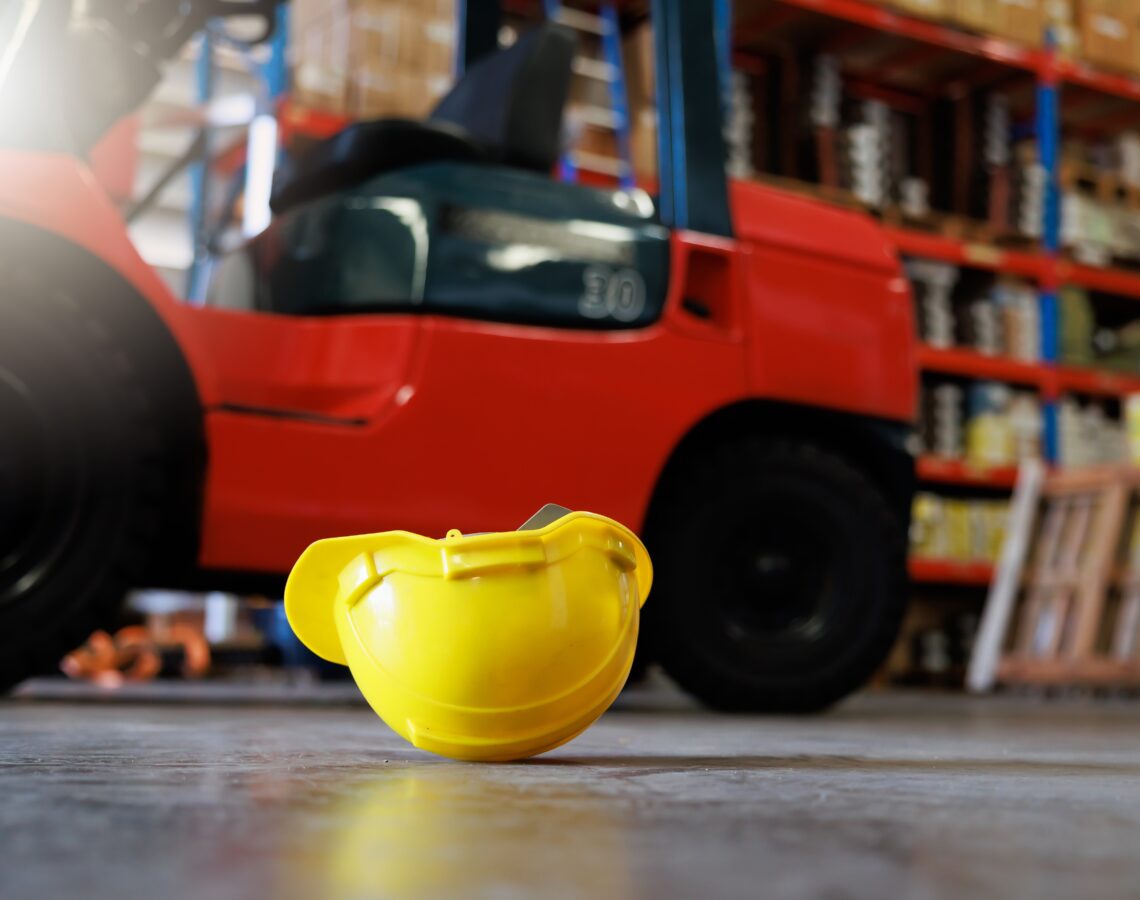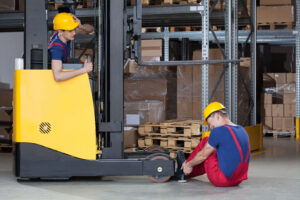How Much Is My Forklift Accident Claim Worth?

Forklifts play a major role in warehouses, manufacturing plants, construction sites, and distribution centers across Indiana. From Indianapolis to Fort Wayne, Evansville to South Bend, forklifts keep business operations moving. However, these powerful machines weigh a lot themselves, not to mention the tons of materials they may carry.
When something goes wrong while operating a forklift, the consequences can leave workers and bystanders with life-altering injuries or worse.
If you’re reading this, you or someone close to you may be dealing with the aftermath of a forklift incident. Medical bills may be piling up, or you may be grieving the loss of a family member and source of income. Whatever your case, you may be wondering about your options for obtaining compensation. One pressing question you might have is, “How much is my forklift accident claim worth?”
Read on to learn about what injured workers in Indiana need to know following a forklift accident. This article covers what affects the value of a forklift injury claim, typical compensation ranges, and how to protect your legal rights.
Whether your accident happened in a warehouse in Gary or on a job site in Bloomington, the goal is to help you figure out what steps to take next. For legal advice and guidance, reach out to an experienced Indiana forklift accident lawyer for a free consultation
Schedule a Free Initial Consultation Today!
Forklift Accident Statistics
 Forklifts—or “industrial trucks”–are heavy, powerful machines. When not used properly—or when safety measures are ignored—they can cause serious harm. According to the Occupational Safety and Health Administration (OSHA), forklift accidents (or accidents involving industrial trucks) cause around 85 deaths and over 34,000 serious injuries every year in the U.S. Thousands more suffer less severe injuries that still disrupt their lives. In 2024 alone, 7485 accidents involving industrial trucks occurred throughout the country.
Forklifts—or “industrial trucks”–are heavy, powerful machines. When not used properly—or when safety measures are ignored—they can cause serious harm. According to the Occupational Safety and Health Administration (OSHA), forklift accidents (or accidents involving industrial trucks) cause around 85 deaths and over 34,000 serious injuries every year in the U.S. Thousands more suffer less severe injuries that still disrupt their lives. In 2024 alone, 7485 accidents involving industrial trucks occurred throughout the country.
In Indiana, forklift-related injuries often show up in state workers’ compensation records, especially in logistics hubs like Plainfield or industrial centers like Terre Haute. The Indiana Department of Labor regularly inspects worksites for safety violations, and forklifts remain one of the top safety concerns in both private warehouses and public sector operations.
The most common contributing factors include:
- Improper operator training
- Poor maintenance
- Overloading or unstable loads
- Speeding or reckless operation
- Lack of safety features or compliance with OSHA standards
When employers or other parties cut corners on safety, workers often pay the price.
Common Types of Forklift Accidents
Forklift accidents don’t all happen the same way. Each scenario carries its own risks, and the type of incident can influence both the severity of injuries and how much compensation is available.
Tip-Overs
Forklifts can become unstable if overloaded or used improperly on inclines. A tipping forklift can crush the operator or anyone nearby. Tip-overs are among the deadliest types of forklift accidents.
Crushing Incidents Between the Forklift and Fixed Objects
In narrow warehouse aisles or tight loading docks, operators can get caught between the forklift and walls, racking, or machinery. These accidents can cause severe trauma to the legs, pelvis, or chest.
Falls from Elevated Forks
Workers sometimes stand on raised pallets or platforms attached to forks to access high areas, even though it’s not safe. If they fall, the resulting injuries may include broken bones, spinal cord damage, or traumatic brain injuries.
Pedestrian Injuries from Being Struck
Forklifts often operate in busy areas where pedestrians are present. Poor visibility, a lack of warning signals, or a distracted operator can lead to someone getting hit. Injuries range from minor bruises to fatal trauma.
Loading/Unloading Accidents
Forklift accidents during loading or unloading can involve falling objects, sudden shifts in cargo, or instability that leads to rollovers. These incidents often injure both the operator and nearby workers.
Factors That Determine the Value of Your Claim
Forklift accident claims don’t come with a fixed price tag. Instead, several variables influence how much compensation an injured worker may receive. The more serious and lasting the harm, the higher the potential claim value.
Severity and Type of Injuries Sustained
Broken bones might heal in weeks, but spinal cord injuries or amputations may last a lifetime. The more serious the injury, the greater the damages, especially when long-term care or permanent disability is involved.
Medical Expenses (Immediate and Long-Term)
Emergency care, surgeries, hospital stays, follow-up visits, physical therapy, and medications all add up quickly. If your treatment will continue for months or years, those future costs should be part of the claim as well.
Lost Wages and Diminished Earning Capacity
If your injuries kept you out of work or forced you to take a lower-paying job, those lost earnings matter. So does your ability to work in the future. Forklift injuries that lead to permanent restrictions often mean long-term financial setbacks.
Pain and Suffering
Not all harm shows up on an X-ray. Chronic pain, sleep problems, anxiety, and the loss of enjoyment in life are also real consequences. Indiana law allows compensation for these kinds of personal losses.
Permanent Disability or Disfigurement
Some injuries leave visible scars or lifelong limitations. The impact on your confidence, independence, and quality of life matters when evaluating the value of your claim.
Age and Pre-Accident Health Condition
Younger workers or those in excellent health before the injury may have longer careers ahead of them, leading to higher lost wage calculations. However, pre-existing conditions don’t prevent recovery—they just factor into how damages are calculated.
Workers’ Compensation vs. Personal Injury Claims
After a forklift accident on the job, the first place many workers turn is Indiana’s workers’ compensation system. But that’s not always the full story.
When Workers’ Compensation Applies
If you were hurt on the job in Indiana—whether in a facility in Lafayette or a factory in Elkhart—your employer’s workers’ comp insurance generally covers medical treatment and a portion of lost wages. You don’t have to prove fault to get these benefits.
Limitations of Workers’ Compensation Benefits
Workers’ comp doesn’t cover everything. Pain and suffering aren’t included. Compensation for lost wages is limited. If you can’t return to work, the system doesn’t always make up the full difference in future income.
When Third-Party Personal Injury Claims Are Possible
If someone other than your employer contributed to the accident—like a subcontractor, equipment manufacturer, or property owner—you may have grounds for a personal injury lawsuit. For example, if a forklift malfunctioned due to a design flaw, the manufacturer could be liable.
How These Claims Can Work Together
You may be eligible for both workers’ comp and a third-party personal injury claim. The workers’ comp covers medical bills, while the personal injury case addresses broader losses. A lawyer can help you pursue both avenues without losing out on either.
Typical Compensation Ranges
Forklift injury settlements vary widely. The value depends on the injury’s severity, available insurance, and whether a third-party claim is involved. These are general estimates based on similar case outcomes:
Minor Injuries ($10,000–$50,000)
Sprains, minor fractures, and short-term back injuries that heal with basic treatment often fall into this category.
Moderate Injuries ($50,000–$150,000)
More serious fractures, soft tissue damage requiring surgery, or injuries that cause long-term discomfort may result in higher compensation.
Severe Injuries ($150,000–$500,000+)
Crushed limbs, head trauma, spinal cord damage, or injuries requiring multiple surgeries fall here. These injuries often result in partial disability and significant lost income.
 Catastrophic Injuries or Wrongful Death (Potentially Millions)
Catastrophic Injuries or Wrongful Death (Potentially Millions)
Permanent brain damage, paralysis, amputation, or loss of life often lead to multi-million-dollar claims, especially when a third-party lawsuit is involved. Families of those killed in forklift accidents may also seek compensation through a wrongful death lawsuit.
Steps to Maximize Your Claim Value
The actions you take after a forklift accident can make a big difference in how much compensation you receive. Insurance companies often look for ways to downplay injuries or shift blame, so protecting your claim starts the moment the incident occurs. Following the right steps helps build a strong case and increases the chances of recovering the full amount you’re owed.
Seek Immediate Medical Attention
Your health comes first, and getting prompt treatment also creates a clear record that links your injuries to the accident. Waiting too long to see a doctor can give insurers room to argue that your injuries aren’t serious—or weren’t caused by the accident. Even if you think the injury isn’t serious, a doctor can identify hidden damage that could worsen over time.
Document the Accident and Your Injuries
Accurate documentation helps preserve the facts and shows the full scope of what happened. If possible, take photos of the accident scene, your injuries, and any equipment involved. Collect the names and contact details of any witnesses. Keep every medical record, receipt, and insurance statement. If you’re physically unable to gather this information yourself, ask a coworker, supervisor, or family member to help.
You should also keep a personal journal of your recovery. Note your pain levels, medications, doctor visits, and how the injury affects your ability to work or perform daily tasks. These records help show the impact the accident has had on your life.
Report the Accident Properly
Notify your employer about the injury as soon as possible. Indiana law requires workers to report workplace injuries within 30 days, but reporting it immediately is always better. Follow any company-specific procedures, such as filling out an incident report or notifying a supervisor. A delayed or incomplete report can lead to questions about whether the accident actually happened at work.
Follow All Medical Instructions
After you’ve been evaluated by a doctor, stick to the treatment plan. Fill your prescriptions, attend follow-up appointments, and avoid any activities your doctor says to stay away from. Skipping steps or returning to work too early can give the insurance company an excuse to say you’re not really hurt—or that you made things worse on your own.
Consistency shows that you’re doing your part to recover. It also strengthens your claim by proving that your injuries are real and require ongoing care.
Consult with an Experienced Attorney
Insurance companies often act in their own best interest, not yours. A skilled attorney understands how these companies work and how to push back when they try to minimize your claim. From the start, an attorney can help you avoid common mistakes, protect your rights, and gather the right evidence to show the full extent of your damages.
They can also help you determine if a third party—such as an equipment manufacturer or subcontractor—shares responsibility. If so, you may be entitled to compensation beyond what workers’ compensation offers. An attorney makes sure no potential source of recovery is overlooked.
How an Attorney Can Help
 Forklift accident cases involve more than just paperwork. Insurance companies often try to minimize claims, downplay injuries, or blame the worker. An attorney steps in to take that burden off your shoulders.
Forklift accident cases involve more than just paperwork. Insurance companies often try to minimize claims, downplay injuries, or blame the worker. An attorney steps in to take that burden off your shoulders.
They’ll review your case, determine if other parties may be responsible, and explain all your legal options. If a third party played a role, they’ll help you build a strong personal injury claim while ensuring you get all the workers’ comp benefits you’re owed. They’ll also negotiate with the insurer and push back when the other side offers less than what your claim is worth.
If the insurance company refuses to settle fairly, your lawyer can prepare the case for court and fight to hold them accountable.
Contact Our Experienced Indiana Forklift Accident Lawyers Today
At Klezmer Maudlin, PC, we know what you’re dealing with after a forklift accident. You’ve got more than enough on your plate without having to argue with insurance companies or track down paperwork. That’s where we step in.
With offices throughout Indiana, including Indianapolis, Evansville, Lafayette, and Jeffersonville, our Indiana personal injury attorneys are here to help workers like you get the full compensation they deserve. Whether your injury happened in a bustling Amazon warehouse or a smaller manufacturing plant, we understand the issues that come with forklift accidents. We’ve helped many people in your shoes recover what they need to move forward.
You can count on us to handle the insurance adjusters, gather the evidence, and pursue all available claims so you can focus on your recovery and your family. Let us do the heavy lifting. Contact Klezmer Maudlin, PC today for a free consultation and get real answers about your forklift accident claim.

